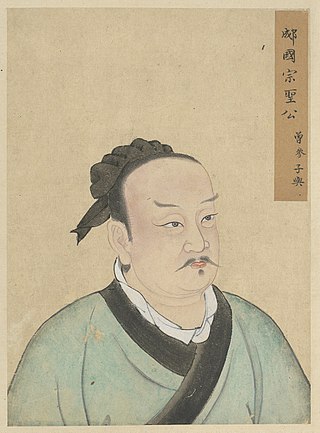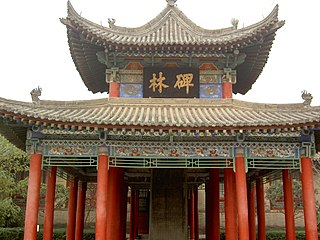Related Research Articles

Confucianism, also known as Ruism or Ru classicism, is a system of thought and behavior originating in ancient China, and is variously described as a tradition, philosophy, religion, theory of government, or way of life. Confucianism developed from teachings of the Chinese philosopher Confucius (551–479 BCE), during a time that was later referred to as the Hundred Schools of Thought era. Confucius considered himself a transmitter of cultural values inherited from the Xia (c. 2070–1600 BCE), Shang (c. 1600–1046 BCE) and Western Zhou dynasties (c. 1046–771 BCE). Confucianism was suppressed during the Legalist and autocratic Qin dynasty (221–206 BCE), but survived. During the Han dynasty, Confucian approaches edged out the "proto-Taoist" Huang–Lao as the official ideology, while the emperors mixed both with the realist techniques of Legalism.

Chinese philosophy originates in the Spring and Autumn period and Warring States period, during a period known as the "Hundred Schools of Thought", which was characterized by significant intellectual and cultural developments. Although much of Chinese philosophy begun in the Warring States period, elements of Chinese philosophy have existed for several thousand years. Some can be found in the I Ching, an ancient compendium of divination, which dates back to at least 672 BCE.
The Chinese classics or canonical texts are the works of Chinese literature authored prior to the establishment of the imperial Qin dynasty in 221 BC. Prominent examples include the Four Books and Five Classics in the Neo-Confucian tradition, themselves an abridgment of the Thirteen Classics. The Chinese classics used a form of written Chinese consciously imitated by later authors, now known as Classical Chinese. A common Chinese word for "classic" literally means 'warp thread', in reference to the techniques by which works of this period were bound into volumes.

Mencius ; born Meng Ke ; or Mengzi was a Chinese Confucian philosopher who has often been described as the "second Sage" (亞聖), that is, second to Confucius himself. He is part of Confucius' fourth generation of disciples. Mencius inherited Confucius' ideology and developed it further. Living during the Warring States period, he is said to have spent much of his life travelling around the states offering counsel to different rulers. Conversations with these rulers form the basis of the Mencius, which would later be canonised as a Confucian classic.
The Great Learning or Daxue was one of the "Four Books" in Confucianism attributed to one of Confucius' disciples, Zengzi. The Great Learning had come from a chapter in the Book of Rites which formed one of the Five Classics. It consists of a short main text of the teachings of Confucius transcribed by Zengzi and then ten commentary chapters supposedly written by Zengzi. The ideals of the book were attributed to Confucius, but the text was written by Zengzi after his death.

Zhu Xi, formerly romanized Chu Hsi, was a Chinese calligrapher, historian, philosopher, poet, and politician during the Song dynasty. Zhu was influential in the development of Neo-Confucianism. He contributed greatly to Chinese philosophy and fundamentally reshaped the Chinese worldview. His works include his editing of and commentaries to the Four Books, his writings on the process of the "investigation of things", and his development of meditation as a method for self-cultivation.

The Analects, also known as the Sayings of Confucius, is an ancient Chinese philosophical text composed of sayings and ideas attributed to Confucius and his contemporaries, traditionally believed to have been compiled by his followers. The consensus among scholars is that large portions of the text were composed during the Warring States period (475–221 BC), and that the work achieved its final form during the mid-Han dynasty. During the early Han, the Analects was merely considered to be a commentary on the Five Classics. However, by the dynasty's end the status of the Analects had grown to being among the central texts of Confucianism.

Neo-Confucianism is a moral, ethical, and metaphysical Chinese philosophy influenced by Confucianism, which originated with Han Yu (768–824) and Li Ao (772–841) in the Tang dynasty, and became prominent during the Song and Ming dynasties under the formulations of Zhu Xi (1130–1200). After the Mongol conquest of China in the thirteenth century, Chinese scholars and officials restored and preserved neo-Confucianism as a way to safeguard the cultural heritage of China.

The Doctrine of the Mean or Zhongyong is one of the Four Books of classical Chinese philosophy and a central doctrine of Confucianism. The text is attributed to Zisi, the only grandson of Confucius. It was originally a chapter in the Classic of Rites.

The well-field system was a Chinese land redistribution method existing between the ninth century BCE to around the Warring States period. Though Mencius describes examples from the Xia and Shang dynasties, these could be mythological or imagined. The name comes from Chinese character 井 (jǐng), which means 'well' and looks like the # symbol; this character represents the theoretical appearance of land division: a square area of land was divided into nine identically sized sections; the eight outer sections were privately cultivated by farmers, or nong in Chinese, one of the occupations of the four occupations system; and the center section was communally cultivated on behalf of the government, or in some cases, the landowning aristocrat or Duke.

The Book of Rites, also known as the Liji, is a collection of texts describing the social forms, administration, and ceremonial rites of the Zhou dynasty as they were understood in the Warring States and the early Han periods. The Book of Rites, along with the Rites of Zhou (Zhōulǐ) and the Book of Etiquette and Rites (Yílǐ), which are together known as the "Three Li (Sānlǐ)," constitute the ritual (lǐ) section of the Five Classics which lay at the core of the traditional Confucian canon. As a core text of the Confucian canon, it is also known as the Classic of Rites or Lijing, which some scholars believe was the original title before it was changed by Dai Sheng.

Zeng Shen, better known as Zengzi, courtesy name Ziyu, was a Chinese philosopher and disciple of Confucius. He later taught Zisi, the grandson of Confucius, who was in turn the teacher of Mencius, thus beginning a line of transmitters of orthodox Confucian traditions. He is revered as one of the Four Sages of Confucianism.
In Chinese philology, the Ancient Script Classics refer to some versions of the Five Classics discovered during the Han dynasty, written in a script that predated the one in use during the Han dynasty, and produced before the burning of the books. The term became used in contrast with "Current Script Classics" (今文經), which indicated a group of texts written in the orthography currently in use during the Han dynasty.

The Kaicheng Stone Classics (開成石經) or Tang Stone Classics are a group of twelve early Chinese classic works carved on the orders of Emperor Wenzong of the Tang dynasty in 833–837 as a reference document for scholars. The works recorded are:
The Thirteen Classics is a term for the group of thirteen classics of Confucian tradition that became the basis for the Imperial Examinations during the Song dynasty and have shaped much of East Asian culture and thought. It includes all of the Four Books and Five Classics but organizes them differently and includes the Classic of Filial Piety and Erya.
The Gongyang Zhuan, also known as the Gongyang Commentary on the Spring and Autumn Annals or the Commentary of Gongyang, is a commentary on the Spring and Autumn Annals, and is thus one of the Chinese classics. Along with the Zuo Zhuan and the Guliang Zhuan, the work is one of the Three Commentaries on the Spring and Autumn Annals. In particular, Gongyang Zhuan is a central work to New Text Confucianism (今文經學), which advocates Confucius as an institutional reformer instead of a respected scholar, and Chunqiu as an embodiment of Confucius' holistic vision on political, social, and moral issues instead of a merely chronicle. Gongyang Zhuan significantly influenced the political institution in Han dynasty. It fell out of favor among elites and was eventually replaced by the Zuo Zhuan. Gongyang Zhuan scholarship was reinvigorated in late Ming dynasty and became a major source of inspiration for Chinese reformers from eighteen to early twentieth century.
Dai De, also known as Da Dai,, birth and death unknown, was a Confucian scholar of the western Han Dynasty. He was active during the reign of Emperor Xuan of Han and then Emperor Yuan of Han.

The Study of Current Script Texts is a school of thought in Confucianism that was based on Confucian classics recompiled in the early Han dynasty by Confucians who survived the burning of books and burying of scholars during the Qin dynasty. The survivors wrote the classics in the contemporary characters of their time, and these texts were later dubbed as "Current Script" 今文. Current Script school attained prominence in the Western Han dynasty and became the official interpretation for Confucianism, which was adopted as the official ideology by Emperor Wu of Han.

Religious Confucianism is an interpretation of Confucianism as a religion. It originated in the time of Confucius with his defense of traditional religious institutions of his time such as the Jongmyo rites, and the ritual and music system.

The Chinese ritual and music system is a social system that originated in the Zhou dynasty to maintain the social order. Together with the patriarchal system, it constituted the social system of the entire ancient China and had a great influence on the politics, culture, art and thought of later generations. The feudal system and the Well-field system were two other institutions that developed at that time. According to legend it was founded by the Duke of Zhou and King Wu of Zhou.
References
- ↑ Bleeker, C. J. and G. Widengren (1971). Historia Religionum, Volume 2 Religions of the Present. BRILL. p. 478. ISBN 90-04-02598-7.
- 1 2 Daniel K. Gardner. The Four Books: The Basic Teachings of the Later Confucian Tradition. Indianapolis: Hackett, 2007. ISBN 978-0-87220-826-1.
- ↑ Nylan, Michael. (Internet Archive Copy) The Five "Confucian" Classics. New Haven: Yale University Press, 2001.
- ↑ Hsin-chung Yao, An Introduction to Confucianism (New York: Cambridge University Press, 2000), pp. 52–54.
- ↑ Kracke 1967, p. 253.